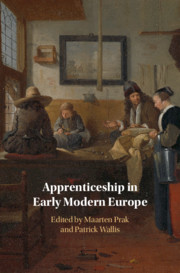Book contents
- Apprenticeship in Early Modern Europe
- Apprenticeship in Early Modern Europe
- Copyright page
- Contents
- Tables
- Figures
- Contributors
- Introduction: Apprenticeship in Early Modern Europe
- 1 The Economics of Apprenticeship
- 2 Artisan Apprenticeship in Early Modern Madrid
- 3 A Large ‘Umbrella’: Patterns of Apprenticeship in Eighteenth-Century Turin
- 4 Apprenticeship in Early Modern Venice
- 5 Actors and Practices of German Apprenticeship, Fifteenth–Nineteenth Centuries
- 6 Rural Artisans’ Apprenticeship Practices in Early Modern Finland (1700–1850)
- 7 Apprenticeships with and without Guilds: The Northern Netherlands
- 8 Apprenticeship in the Southern Netherlands, c. 1400–c. 1800
- 9 Apprenticeship in England
- 10 Surviving the End of the Guilds: Apprenticeship in Eighteenth- and Nineteenth-Century France
- Conclusion: Apprenticeship in Europe – A Survey
- Index
2 - Artisan Apprenticeship in Early Modern Madrid
Published online by Cambridge University Press: 18 October 2019
- Apprenticeship in Early Modern Europe
- Apprenticeship in Early Modern Europe
- Copyright page
- Contents
- Tables
- Figures
- Contributors
- Introduction: Apprenticeship in Early Modern Europe
- 1 The Economics of Apprenticeship
- 2 Artisan Apprenticeship in Early Modern Madrid
- 3 A Large ‘Umbrella’: Patterns of Apprenticeship in Eighteenth-Century Turin
- 4 Apprenticeship in Early Modern Venice
- 5 Actors and Practices of German Apprenticeship, Fifteenth–Nineteenth Centuries
- 6 Rural Artisans’ Apprenticeship Practices in Early Modern Finland (1700–1850)
- 7 Apprenticeships with and without Guilds: The Northern Netherlands
- 8 Apprenticeship in the Southern Netherlands, c. 1400–c. 1800
- 9 Apprenticeship in England
- 10 Surviving the End of the Guilds: Apprenticeship in Eighteenth- and Nineteenth-Century France
- Conclusion: Apprenticeship in Europe – A Survey
- Index
Summary
In Spain, apprenticeship was regulated locally. In Madrid, the local guilds played a crucial role in the organisation of apprenticeship, but alternatives were also available. This chapter examines artisan apprenticeship in Madrid during the early modern age. The main body of research comprises a sample of 4,570 indenture contracts elicited from the Historical Notarial Archive of Madrid. They correspond to over a hundred trades and cover the period 1540–1830, with the central focus on the eighteenth century. In addition, apprenticeship channels alternative to the traditional guild-like model are also explored, which impinged overall on women. A relatively small percentage of apprentices paid their master for the training. Remuneration of the apprentice’s work happened mostly in kind, as room and board, but increasingly also in cash. The majority of Madrid’s apprentices did not follow in their parents’ trade, but rather opted for a different trade. Most apprentices in Madrid completed their training, but relatively few managed to become masters. The masters’ ranks were mostly filled by immigrant journeymen. During the second half of the eighteenth century, state policies pried open the grip of the guilds on the apprenticeship system, allowing more women to acquire craft skills.
- Type
- Chapter
- Information
- Apprenticeship in Early Modern Europe , pp. 44 - 77Publisher: Cambridge University PressPrint publication year: 2019
- 1
- Cited by



